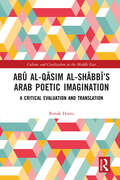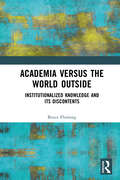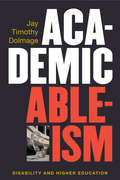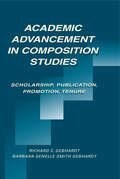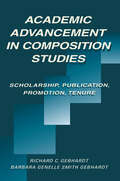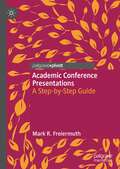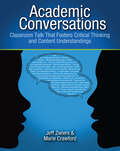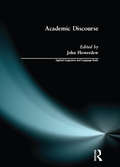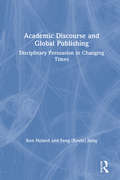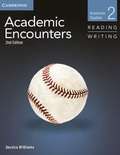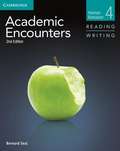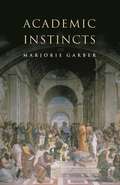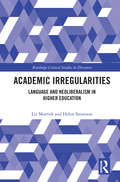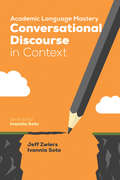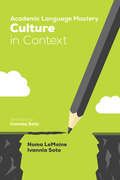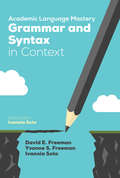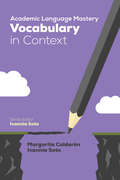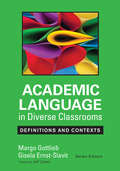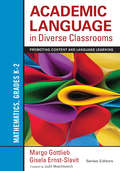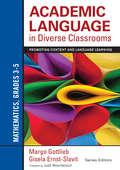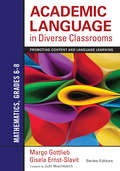- Table View
- List View
Abū al-Qāsim al-Shābbī’s Arab Poetic Imagination: A Critical Evaluation and Translation (Culture and Civilization in the Middle East)
by Ronak HusniThis timely book critically evaluates the life, work and milieu of the Tunisian poet, Abū al-Qāsim al-Shābbī (1909-1934), providing translations and detailed commentaries around his seminal work “al-Khayāl al-ShiꜤrī ʿinda al-ʿArab” (“Arabic Poetic Imagination").The volume delves into the profound essence of one of Tunisia’s most iconic poets, a seminal figure in Arab literary modernism, celebrated for his fervent and transformative verses that continue to inspire audiences worldwide, far surpassing the boundaries of the Arab-speaking realm. This book not only presents meticulous translations of al-Shābbī’s significant poetic works, but also analyses the recurring themes and styles that define his oeuvre, offering insights into his lasting impact. The book contextualises al-Shābbī within the socio-political turbulence of early 20th century Tunisia, a period marked by profound changes that shaped his artistic outlook. It explores his deep engagement with both romantic and modernist motifs, seamlessly weaving together elements of nationalism, existentialist conflict, and a steadfast vision for a liberated Arab world. Furthermore, the critical commentaries in the book illuminate the array of poets and philosophical concepts that al-Shābbī references, directing readers to additional resources on both Arab and Western literary figures he discusses, enriching our appreciation of his intellectual interplay and deepening our understanding of his scholarly pursuits.This volume will be of pivotal interest for scholars, students and academics of Modern and Classical Arabic Literature, as well as those with an interest in these topic areas more generally.
Academia versus the World Outside: Institutionalized Knowledge and Its Discontents
by Bruce FlemingAcademia versus the World Outside lays out the givens of the knowledge industry located within the ivory tower, colleges and universities. It then moves outside academia to consider this restricted world the way most people see it. The contrast between these two views of academia explains and is at the basis of the left–right animosity of our day.The knowledge industry, a creation of the post-Enlightenment modern age along with other industrial and post-industrial enterprises, is based on creating and adding to a store of knowledge as its own end. This makes academia alien to the more random and personal nature of knowledge acquisition in our everyday lives, as indeed every industry is alien to everyday life in the modern age. Yet most academics are so immersed in the peculiar project they have chosen as their life’s work that they are either unaware of or unsympathetic to the fact that people outside live very different lives with very different presuppositions. Most non-academics, for their part, find academia strange, and for very good reason. Academia versus the World Outside makes this contrast and conflict clear from both directions.This book is aimed primarily at academics, most of whom so take for granted the givens of what they do that they fail to understand why the vast majority of people outside find academia alien. This has led to an increasingly hostile and utterly predictable left–right political conflict, academia tending increasingly left and the world outside increasingly right. The goal of this book is to reduce the tension between both sides: if read by non-academics, this book may help these understand the givens of a world as strange to everyday life as any other specialized industry in the modern age.
Academic Ableism: Disability and Higher Education (Corporealities: Discourses Of Disability)
by Jay T Dolmage<P>Academic Ableism brings together disability studies and institutional critique to recognize the ways that disability is composed in and by higher education, and rewrites the spaces, times, and economies of disability in higher education to place disability front and center. <P>For too long, argues Jay Timothy Dolmage, disability has been constructed as the antithesis of higher education, often positioned as a distraction, a drain, a problem to be solved. The ethic of higher education encourages students and teachers alike to accentuate ability, valorize perfection, and stigmatize anything that hints at intellectual, mental, or physical weakness, even as we gesture toward the value of diversity and innovation. <P> Examining everything from campus accommodation processes, to architecture, to popular films about college life, Dolmage argues that disability is central to higher education, and that building more inclusive schools allows better education for all.
Academic Advancement in Composition Studies: Scholarship, Publication, Promotion, Tenure
by Richard C. Gebhardt Barbara Genelle Smith GebhardtThis volume deals with a number of related issues that are becoming increasingly crucial for English studies during this time when most faculty in the field are assistant professors approaching tenure review or associate professors seeking promotion. These critical issues focus on: * The diversity of research and scholarly publication in composition studies; * The fact that composition studies faculty are often evaluated by personnel committee members, department chairs, and deans unfamiliar with the nature and demands of the field; * The way that American higher education is rethinking "scholarship" and the role it plays in the work and evaluation of faculty members; and * The role composition studies faculty can play in this review of scholarship and professional advancement. This book seeks to address the entire spectrum of "composition studies" -- expository and argumentative writing, personal essay, literary nonfiction, technical and business writing, historical rhetoric, empirical research, and more -- by understanding the nature of and evaluating the work of faculty members in this broad field. Scholarship and advancement issues are discussed in a variety of situations including basic and regular first-year composition classes at four-year and two-year institutions or writing centers, advanced writing courses, ESL and skills-development programs, and writing classes and programs for teachers, administrators, and researchers. The chapters focus on a variety of subjects, including the importance of mentoring and faculty development in all departments and institutions; and how young scholar-teachers and assistant professors can prepare for a successful personnel or tenure review.
Academic Advancement in Composition Studies: Scholarship, Publication, Promotion, Tenure
by Richard C. Gebhardt Barbara Genelle Smith GebhardtThis volume deals with a number of related issues that are becoming increasingly crucial for English studies during this time when most faculty in the field are assistant professors approaching tenure review or associate professors seeking promotion. These critical issues focus on: * The diversity of research and scholarly publication in composition studies; * The fact that composition studies faculty are often evaluated by personnel committee members, department chairs, and deans unfamiliar with the nature and demands of the field; * The way that American higher education is rethinking "scholarship" and the role it plays in the work and evaluation of faculty members; and * The role composition studies faculty can play in this review of scholarship and professional advancement. This book seeks to address the entire spectrum of "composition studies" -- expository and argumentative writing, personal essay, literary nonfiction, technical and business writing, historical rhetoric, empirical research, and more -- by understanding the nature of and evaluating the work of faculty members in this broad field. Scholarship and advancement issues are discussed in a variety of situations including basic and regular first-year composition classes at four-year and two-year institutions or writing centers, advanced writing courses, ESL and skills-development programs, and writing classes and programs for teachers, administrators, and researchers. The chapters focus on a variety of subjects, including the importance of mentoring and faculty development in all departments and institutions; and how young scholar-teachers and assistant professors can prepare for a successful personnel or tenure review.
Academic Conference Presentations: A Step-by-Step Guide
by Mark R. FreiermuthThis book provides a step-by-step journey to giving a successful academic conference presentation, taking readers through all of the potential steps along the way—from the initial idea and the abstract submission all the way up to the presentation itself. Drawing on the author's own experiences, the book highlights good and bad practices while explaining each introduced feature in a very accessible style. It provides tips on a wide range of issues such as writing up an abstract, choosing the right conference, negotiating group presentations, giving a poster presentation, what to include in a good presentation, conference proceedings and presenting at virtual or hybrid events. This book will be of particular interest to graduate students, early-career researchers and non-native speakers of English, as well as students and scholars who are interested in English for Academic Purposes, Applied Linguistics, Communication Studies and generally speaking, most of the Social Sciences. With that said, because of the book’s theme, many of the principles included within will appeal to broad spectrum of academic disciplines.
Academic Conversations: Classroom Talk that Fosters Critical Thinking and Content Understandings
by Jeff Zwiers Marie CrawfordConversing with others has given insights to different perspectives, helped build ideas, and solve problems. Academic conversations push students to think and learn in lasting ways. Academic conversations are back-and-forth dialogues in which students focus on a topic and explore it by building, challenging, and negotiating relevant ideas. In Academic Conversations: Classroom Talk that Fosters Critical Thinking and Content Understandings authors Jeff Zwiers and Marie Crawford address the challenges teachers face when trying to bring thoughtful, respectful, and focused conversations into the classroom. They identify five core communications skills needed to help students hold productive academic conversation across content areas: Elaborating and Clarifying Supporting Ideas with Evidence Building On and/or Challenging Ideas Paraphrasing Synthesizing This book shows teachers how to weave the cultivation of academic conversation skills and conversations into current teaching approaches. More specifically, it describes how to use conversations to build the following: Academic vocabulary and grammar Critical thinking skills such as persuasion, interpretation, consideration of multiple perspectives, evaluation, and application Literacy skills such as questioning, predicting, connecting to prior knowledge, and summarizing An academic classroom environment brimming with respect for others' ideas, equity of voice, engagement, and mutual support The ideas in this book stem from many hours of classroom practice, research, and video analysis across grade levels and content areas. Readers will find numerous practical activities for working on each conversation skill, crafting conversation-worthy tasks, and using conversations to teach and assess. Academic Conversations offers an in-depth approach to helping students develop into the future parents, teachers, and leaders who will collaborate to build a better world.
Academic Discourse (Applied Linguistics and Language Study)
by John FlowerdewAcademic Discourse presents a collection of specially commissioned articles on the theme of academic discourse. Divided into sections covering the main approaches, each begins with a state of the art overview of the approach and continues with exemplificatory empirical studies. Genre analysis, corpus linguistics, contrastive rhetoric and ethnography are comprehensively covered through the analysis of various academic genres: research articles, PhD these, textbooks, argumentative essays, and business cases. Academic Discourse brings together state-of-the art analysis and theory in a single volume. It also features: - an introduction which provides a survey and rationale for the material - implications for pedagogy at the end of each chapter- topical review articles with example studies- a glossary The breadth of critical writing, and from a wide geographical spread, makes Academic Discourse a fresh and insightful addition to the field of discourse analysis.
Academic Discourse and Global Publishing: Disciplinary Persuasion in Changing Times
by Ken Hyland Feng (Kevin) JiangAcademic Discourse and Global Publishing offers a coherent argument for changes in published academic writing over the past 50 years. Demonstrating how published writing represents academics’ decisions about how best to present their work, their readers and themselves in the global context of a rapidly shifting university system, this book provides: An up-to-date reference on contemporary topics in specialist discourse analysis, current research methodologies and innovative approaches to the study of writing; New insights into conceptual and theoretical issues related to the analysis of academic writing; An accessible introduction to diachronic research in EAP and a case for the value of the diachronic study of texts using corpus techniques; A clear overview of how texts work in interaction and how they relate to evolving institutional and political contexts; Links between the practices of different disciplines and the environments in which they operate, as well as observations on the ways in which they differ. This volume is essential reading for students and researchers of EAP/ESP and Applied Linguistics and will also be of significant interest to academics and students looking to have their work published.
Academic Encounters Reading Writing: American Studies
by Janis P. MeekTopics include the foundations of government, equal rights, and the American Dream. Students develop important skills such as skimming, reading for the main idea, reading for speed, understanding vocabulary in context, summarizing, and note-taking. By completing writing assignments, students build academic writing skills and incorporate what they have learned.
Academic Encounters, Level 4: Human Behavior (2nd Edition)
by Bernard SealThe Academic Encounters 2nd edition series uses a sustained content approach to teach skills necessary for taking academic courses in English. There are two books for each content area. Academic Encounters Level 4 Reading and Writing Human Behavior engages students with authentic academic readings from college textbooks, photos, and charts on stimulating topics from the fields of psychology and communications. Topics include health, intelligence, and interpersonal relationships. Students develop important skills such as skimming, reading for the main idea, reading for speed, understanding vocabulary in context, summarizing, and note-taking. By completing writing assignments, students build academic writing skills and incorporate what they have learned. The topics correspond with those in Academic Encounters Level 4 Listening and Speaking Human Behavior. The books may be used independently or together.
Academic Instincts
by Marjorie GarberIn this lively and provocative book, cultural critic Marjorie Garber, who has written on topics as different as Shakespeare, dogs, cross-dressing, and real estate, explores the pleasures and pitfalls of the academic life. Academic Instincts discusses three of the perennial issues that have surfaced in recent debates about the humanities: the relation between "amateurs" and "professionals," the relation between one academic discipline and another, and the relation between "jargon" and "plain language." Rather than merely taking sides, the book explores the ways in which such debates are essential to intellectual life. Garber argues that the very things deplored or defended in discussions of the humanities cannot be either eliminated or endorsed because the discussion itself is what gives humanistic thought its vitality. Written in spirited and vivid prose, and full of telling detail drawn both from the history of scholarship and from the daily press, Academic Instincts is a book by a well-known Shakespeare scholar and prize-winning teacher who offers analysis rather than polemic to explain why today's teachers and scholars are at once breaking new ground and treading familiar paths. It opens the door to an important nationwide and worldwide conversation about the reorganization of knowledge and the categories in and through which we teach the humanities. And it does so in a spirit both generous and optimistic about the present and the future of these disciplines.
Academic Irregularities: Language and Neoliberalism in Higher Education (Routledge Critical Studies in Discourse)
by Helen Sauntson Liz MorrishThis volume serves as a critical examination of the discourses at play in the higher education system and the ways in which these discourses underpin the transmission of neoliberal values in 21st century universities. Situated within a Critical Discourse Analysis-based framework, the book also draws upon other linguistic approaches, including corpus linguistics and appraisal analysis, to unpack the construction and development of the management style known as managerialism, emergent in the 1990s US and UK higher education systems, and the social dynamics and power relations embedded within the discourses at the heart of managerialism in today’s universities. Each chapter introduces a particular aspect of neoliberal discourse in higher education and uses these multiple linguistic approaches to analyze linguistic data in two case studies and demonstrate these principles at work. This multi-layered systematic linguistic framework allows for a nuanced exploration of neoliberal institutional discourse and its implications for academic labor, offering a critique of the managerial system in higher education but also a larger voice for alternative discursive narratives within the academic community. This important work is a key resource for students and scholars in applied linguistics, Critical Discourse Analysis, sociology, business and management studies, education, and cultural studies.
Academic Language Mastery: Conversational Discourse in Context
by Jeff Zwiers Ivannia SotoBy now it’s a given: if we’re to help our ELLs and SELs access the rigorous demands of today’s content standards, we must cultivate the "code" that drives school success: academic language. Look no further for assistance than this much-anticipated series from Ivannia Soto, in which she invites field authorities Jeff Zwiers, David and Yvonne Freeman, Margarita Calderon, and Noma LeMoine to share every teacher’s need-to-know strategies on the four essential components of academic language. The subject of this volume is conversational discourse. Here, Jeff Zwiers reveals the power of academic conversation in helping students develop language, clarify concepts, comprehend complex texts, and fortify thinking and relational skills. With this book as your roadmap, you’ll learn how to: Foster the skills and language students must develop for productive interactions Implement strategies for scaffolding paired conversations Assess student’s oral language development as you go It’s imperative that our ELLs and SELs practice academic language in rich conversations with others in school, especially when our classrooms may be their only opportunities to receive modeling, scaffolding, and feedback focused on effective discourse. This book, in concert with the other three volumes in the series, can provide both a foundation and a framework for accelerating the learning of diverse students across grade levels and disciplines.
Academic Language Mastery: Conversational Discourse in Context
by Jeff Zwiers Ivannia SotoBy now it’s a given: if we’re to help our ELLs and SELs access the rigorous demands of today’s content standards, we must cultivate the "code" that drives school success: academic language. Look no further for assistance than this much-anticipated series from Ivannia Soto, in which she invites field authorities Jeff Zwiers, David and Yvonne Freeman, Margarita Calderon, and Noma LeMoine to share every teacher’s need-to-know strategies on the four essential components of academic language. The subject of this volume is conversational discourse. Here, Jeff Zwiers reveals the power of academic conversation in helping students develop language, clarify concepts, comprehend complex texts, and fortify thinking and relational skills. With this book as your roadmap, you’ll learn how to: Foster the skills and language students must develop for productive interactions Implement strategies for scaffolding paired conversations Assess student’s oral language development as you go It’s imperative that our ELLs and SELs practice academic language in rich conversations with others in school, especially when our classrooms may be their only opportunities to receive modeling, scaffolding, and feedback focused on effective discourse. This book, in concert with the other three volumes in the series, can provide both a foundation and a framework for accelerating the learning of diverse students across grade levels and disciplines.
Academic Language Mastery: Culture In Context
by Noma R. LeMoine Ivannia SotoBy now it’s a given: if we’re to help our ELLs and SELs access the rigorous demands of today’s content standards, we must cultivate the "code" that drives school success: academic language. Look no further for assistance than this much-anticipated series from Ivannia Soto, in which she invites field authorities Jeff Zwiers, David and Yvonne Freeman, Margarita Calderon, and Noma LeMoine to share every teacher’s need-to-know strategies on the four essential components of academic language. The subject of this volume is culture. Here, Noma LeMoine makes clear once and for all how culturally and linguistically responsive pedagogy validates, facilitates, liberates, and empowers ethnically diverse students. With this volume as your roadmap, you’ll learn how to: Implement instructional strategies designed to meet the linguistic and cultural needs of ELLs and SELs Use language variation as an asset in the classroom Recognize and honor prior knowledge, home languages, and cultures The culture and language every student brings to the classroom have vast implications for how to best structure the learning environment. This guidebook will help you get started as early as tomorrow. Better yet, read all four volumes in the series as an all-in-one instructional plan for closing the achievement gap.
Academic Language Mastery: Culture In Context
by Noma R. LeMoine Ivannia SotoBy now it’s a given: if we’re to help our ELLs and SELs access the rigorous demands of today’s content standards, we must cultivate the "code" that drives school success: academic language. Look no further for assistance than this much-anticipated series from Ivannia Soto, in which she invites field authorities Jeff Zwiers, David and Yvonne Freeman, Margarita Calderon, and Noma LeMoine to share every teacher’s need-to-know strategies on the four essential components of academic language. The subject of this volume is culture. Here, Noma LeMoine makes clear once and for all how culturally and linguistically responsive pedagogy validates, facilitates, liberates, and empowers ethnically diverse students. With this volume as your roadmap, you’ll learn how to: Implement instructional strategies designed to meet the linguistic and cultural needs of ELLs and SELs Use language variation as an asset in the classroom Recognize and honor prior knowledge, home languages, and cultures The culture and language every student brings to the classroom have vast implications for how to best structure the learning environment. This guidebook will help you get started as early as tomorrow. Better yet, read all four volumes in the series as an all-in-one instructional plan for closing the achievement gap.
Academic Language Mastery: Grammar And Syntax In Context
by Yvonne S. Freeman David E. Freeman Ivannia SotoBy now it’s a given: if we’re to help our ELLs and SELs access the rigorous demands of today’s content standards, we must cultivate the "code" that drives school success: academic language. Look no further for assistance than this much-anticipated series from Ivannia Soto, in which she invites field authorities Jeff Zwiers, David and Yvonne Freeman, Margarita Calderon, and Noma LeMoine to share every teacher’s need-to-know strategies on the four essential components of academic language. The subject of this volume is grammar and syntax. Here, David and Yvonne Freeman shatter the myth that academic language is all about vocabulary, revealing how grammar and syntax inform our students’ grasp of challenging text. With this book as your roadmap, you’ll learn how to: Teach grammar in the context of students’ speech and writing Use strategies such as sentence frames, passives, combining simple sentences into more complex sentences, and nominalization to create more complex noun phrases Assess academic language development through a four-step process Look inside and discover the tools you need to help students master more sophisticated and complex grammatical and syntactical structures right away. Better yet, read all four volumes in the series and put in place a start-to-finish instructional plan for closing the achievement gap.
Academic Language Mastery: Grammar And Syntax In Context
by Yvonne S. Freeman David E. Freeman Ivannia SotoBy now it’s a given: if we’re to help our ELLs and SELs access the rigorous demands of today’s content standards, we must cultivate the "code" that drives school success: academic language. Look no further for assistance than this much-anticipated series from Ivannia Soto, in which she invites field authorities Jeff Zwiers, David and Yvonne Freeman, Margarita Calderon, and Noma LeMoine to share every teacher’s need-to-know strategies on the four essential components of academic language. The subject of this volume is grammar and syntax. Here, David and Yvonne Freeman shatter the myth that academic language is all about vocabulary, revealing how grammar and syntax inform our students’ grasp of challenging text. With this book as your roadmap, you’ll learn how to: Teach grammar in the context of students’ speech and writing Use strategies such as sentence frames, passives, combining simple sentences into more complex sentences, and nominalization to create more complex noun phrases Assess academic language development through a four-step process Look inside and discover the tools you need to help students master more sophisticated and complex grammatical and syntactical structures right away. Better yet, read all four volumes in the series and put in place a start-to-finish instructional plan for closing the achievement gap.
Academic Language Mastery: Vocabulary In Context
by Margarita Espino Calderon Ivannia SotoBy now it’s a given: if we’re to help our ELLs and SELs access the rigorous demands of today’s content standards, we must cultivate the "code" that drives school success: academic language. Look no further for assistance than this much-anticipated series from Ivannia Soto, in which she invites field authorities Jeff Zwiers, David and Yvonne Freeman, Margarita Calderon, and Noma LeMoine to share every teacher’s need-to-know strategies on the four essential components of academic language. The subject of this volume is vocabulary. Here, Margarita Calderon reveals how vocabulary is best taught as a tool for completing and constructing more complex messages. With this book as your roadmap, you’ll learn how to: Teach high-frequency academic words and discipline-specific vocabulary across content areas Utilize strategies for teaching academic vocabulary, moving students from Tier 1 to Tiers 2 and 3 words and selecting appropriate words to teach Assess vocabulary growth as you go Our vocabulary instruction must come from the texts our ELLs and SELs are about to read, not from a set of activities that teach words in isolation. This guidebook will help you get started as early as tomorrow. Better yet, read all four volumes in the series and put in place an all-in-one instructional plan for closing the achievement gap.
Academic Language Mastery: Vocabulary In Context
by Margarita Espino Calderon Ivannia SotoBy now it’s a given: if we’re to help our ELLs and SELs access the rigorous demands of today’s content standards, we must cultivate the "code" that drives school success: academic language. Look no further for assistance than this much-anticipated series from Ivannia Soto, in which she invites field authorities Jeff Zwiers, David and Yvonne Freeman, Margarita Calderon, and Noma LeMoine to share every teacher’s need-to-know strategies on the four essential components of academic language. The subject of this volume is vocabulary. Here, Margarita Calderon reveals how vocabulary is best taught as a tool for completing and constructing more complex messages. With this book as your roadmap, you’ll learn how to: Teach high-frequency academic words and discipline-specific vocabulary across content areas Utilize strategies for teaching academic vocabulary, moving students from Tier 1 to Tiers 2 and 3 words and selecting appropriate words to teach Assess vocabulary growth as you go Our vocabulary instruction must come from the texts our ELLs and SELs are about to read, not from a set of activities that teach words in isolation. This guidebook will help you get started as early as tomorrow. Better yet, read all four volumes in the series and put in place an all-in-one instructional plan for closing the achievement gap.
Academic Language in Diverse Classrooms: Definitions and Contexts
by Dr Margo Gottlieb Gisela Ernst-SlavitEnsure your school speaks the language of success! Since the introduction of the Common Core, schools realize the necessity for a deep understanding of academic language as a stepping stone to academic achievement. The expectations for more robust curriculum, instruction, and assessment require administrators, teachers, and students to retool for academic success. This companion volume to Margo Gottlieb and Gisela Ernst-Slavit’s six-book series on academic language provides a thorough overview of key concepts and effective practices. Optimized for curricular planning and in-classroom reference, with particular attention to linguistically and culturally diverse students, the book includes: Definitions and examples of the dimensions of academic language. A step-by-step template for teachers to incorporate academic language into their planning for student learning. Graphic models that illustrate academic language use across the content areas.
Academic Language in Diverse Classrooms: Promoting Content and Language Learning
by Dr Margo Gottlieb Gisela Ernst-SlavitMake every student fluent in the language of learning. The Common Core and ELD standards provide pathways to academic success through academic language. Using an integrated Curricular Framework, districts, schools and professional learning communities can: Design and implement thematic units for learning Draw from content and language standards to set targets for all students Examine standards-centered materials for academic language Collaborate in planning instruction and assessment within and across lessons Consider linguistic and cultural resources of the students Create differentiated content and language objectives Delve deeply into instructional strategies involving academic language Reflect on teaching and learning
Academic Language in Diverse Classrooms: Promoting Content and Language Learning
by Dr Margo Gottlieb Gisela Ernst-SlavitMake every student fluent in the language of learning. The Common Core and ELD standards provide pathways to academic success through academic language. Using an integrated Curricular Framework, districts, schools and professional learning communities can: Design and implement thematic units for learning Draw from content and language standards to set targets for all students Examine standards-centered materials for academic language Collaborate in planning instruction and assessment within and across lessons Consider linguistic and cultural resources of the students Create differentiated content and language objectives Delve deeply into instructional strategies involving academic language Reflect on teaching and learning
Academic Language in Diverse Classrooms: Promoting Content and Language Learning
by Dr Margo Gottlieb Gisela Ernst-SlavitMake every student fluent in the language of learning. The Common Core and ELD standards provide pathways to academic success through academic language. Using an integrated Curricular Framework, districts, schools and professional learning communities can: Design and implement thematic units for learning Draw from content and language standards to set targets for all students Examine standards-centered materials for academic language Collaborate in planning instruction and assessment within and across lessons Consider linguistic and cultural resources of the students Create differentiated content and language objectives Delve deeply into instructional strategies involving academic language Reflect on teaching and learning
